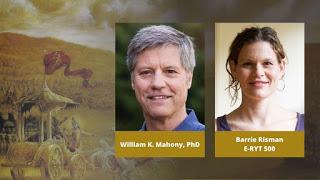
A Sunbeam over the Sea by Henry Moore
Recently, I was listening to a story on National Public Radio about a group of community organizers in Vermont who were putting new systems into place to coordinate their efforts for bringing meals to homebound seniors. One organizer said something like, “This isn’t the time for thinking about things, it’s a time for taking action; there’s no time for philosophy, things have to get done.”“No time for philosophy.” That phrase stuck with me. I suspect many of us might have felt that way during the pandemic. When it comes to organizing food deliveries, I get it. But for the yoga practitioner, I’m not so sure.
I understand how, in some ways, yoga philosophy might not seem very useful or applicable right now. At a time when so many of us are dealing with very practical and serious challenges like having enough money to buy food or a safe place to live, we might feel like there’s no place in our current reality for the teachings of yoga. It might feel like it’s a privilege even to have the luxury of time and mental space for thinking about things like philosophy. Spirituality itself might feel like an extravagance as we deal with the collective uncertainty of this time.
I also get how it’s easy at a time like this, even for those of us who aren’t facing challenges to our very survival, to get so caught up in managing our day to day reality that we forget the some of the basic, underlying values that might help us better navigate our way through this time, the very perspectives that might really support us and bring us the meaning and comfort we need right now.
But honestly the thing that has brought me the most solace these days, that has brought me inner stability in these times of such great collective uncertainty, and that I’ve been able to hold onto even amidst moments of deep questioning and all the ups and downs of my emotions, is the wisdom teachings of yoga. This “philosophy” has unfailingly come to my support every time. As the Bhagavad Gita teaches:Here, there is no wasted effort, nor is there any negative result.
Even a little knowledge of this truth protects one from great fear. —2.40, translation by Bill Mahony
Of course, practical action is needed for sure, but let’s not forget the power of the teachings and the vision of the practices we do. Let’s not forget that the movement, awareness, and concentration practices we do all share roots in a very particular perspective and vision. And this vision has the potential to—indeed, is designed to—bring us strength, hope, and resilience.
Yes, even amidst moments of fear, anxiety, and confusion we can use the wisdom teachings of our tradition. It’s not extravagant. It’s a necessity. For me, it’s been absolutely essential to maintain some sort of perspective. Time spent in contemplative study allows me to find glimmers of hope and meaning. It helps me face difficult emotions and a scattered mental landscape with acceptance, spaciousness, and breath, and in my better moments with compassion and love."Set thy heart upon thy work, but never on its reward.Work not for a reward; but never cease to do thy work.
Do thy work in the peace of Yoga and, free from selfish desires, be not moved in success or failure.
Yoga is evenness of mind—a peace that is ever the same." —Bhagavad Gita, translation by Juan MascaroIf you would like to learn more about how the yoga philosophy of the Bhagavad Gita in particular can help you maintain perspective during these challenging times, I’ll be co-teaching a special 3-week course on the Gita with Prof. Bill Mahony starting February 1: The Triumphant Heart: Lessons from the Bhagavad Gita on Yogic Living in Challenging Times. I hope some of you will join me there.


